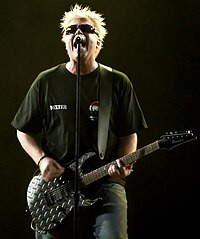Dexter Holland
| Dexter Holland | |
|---|---|

Holland performing with The Offspring in 2009
|
|
| Background information | |
| Birth name | Bryan Keith Holland |
| Born | December 29, 1965 |
| Origin | Garden Grove, California, US |
| Genres | Punk rock, skate punk, pop punk, ska punk, alternative rock |
| Occupation(s) | Musician, singer, songwriter |
| Instruments | Vocals, guitar, drums, piano, keyboards, percussion, bass |
| Years active | 1984–present |
| Labels | Nitro, Epitaph, Sony BMG Music Entertainment, Columbia, Time Bomb |
| Associated acts | The Offspring |
| Notable instruments | |
| Gibson SG Junior | |
| Alma mater | University of Southern California (BS, MS) |
Bryan Keith "Dexter" Holland (born December 29, 1965) is an American musician, best known as the singer, rhythm guitarist, and primary songwriter for the punk rock band The Offspring.
Holland attended Pacifica High School in Garden Grove, California, where he graduated as class valedictorian in 1984. During high school, Holland was the best student in mathematics in his year, and he found it "just as exciting as punk rock". He then attended the University of Southern California, where he earned a BS in biology and an MS in molecular biology, and commenced a PhD in molecular biology. After the success of The Offspring, he suspended his candidature to focus on music. Holland had said in 1995 that, when he turns 40, he would rather be a professor at a university than play music.
As of 2013, Holland is a doctoral student at the Laboratory of Viral Oncology and Proteomics Research, Keck School of Medicine, where he is supervised by Professor Suraiya Rasheed. In March 2013, Holland and co-authors published a paper in PLoS One regarding microRNA in HIV genomes, titled "Identification of Human MicroRNA-Like Sequences Embedded within the Protein-Encoding Genes of the Human Immunodeficiency Virus". The original academic paper describes the use of computational molecular biological (in silico) approaches to identify microRNA-like sequences in HIV. These sequences are suggested to have evolved to self-regulate survival of the virus in the host by evading its immune responses and thus influence the persistence, replication, and pathogenicity of HIV.
...
Wikipedia
